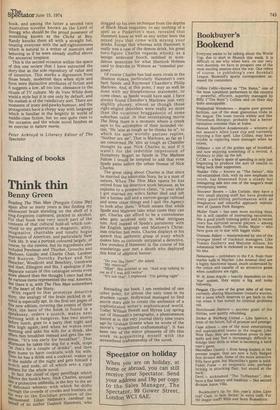Talking of books
Think thin
Benny Green
Reading The Thin Man (Penguin Crime 30p) again after so many years is like finding my adolescent brain standing on the shelf of a long-forgotten cupboard, pickled in alcohol. For that book was very much part of the contents of that cultural hold-all which conYeyed to my generation a magnetic, witty, imaginative, charitable and totally bogus impression of American, and particularly New York life. It was a portrait coloured largely, of Course, by the cinema, but its ingredients also _included Perelman and Thurber, Groucho and Marlowe, Gatsby and Charlie Chan, Lardner and Runyon, Dorothy Parker and Nat Fleischer, Woollcott and Benchley, Gershwin and Hart, Ellington and Bix. I apologise if the disparate nature of this catalogue seems even More absurd than the thought I once had that I,ts various items represented the real America. Mit there it is, with The Thin Man somewhere at the heart of the litany. With regard to that prototype detective story, the analogy of the brain pickled in alcohol is especially apt. In the first ten pages of ,this new edition, covering the events of three uaYs, the hero of the book is found in a speakeasy, orders a scotch, wakes next 1,Porning with a hangover, has two snorts °efore lunch, goes to a party that night and gets high again, and when he wakes next Morning and asks his wife for a drink, she offers him breakfast instead and gets the resl)onse, "It's too early for breakfast". That fternoon he takes the dog for a walk, stops at Jim's for a couple of drinks", and then Ves home to have cocktails with his wife. • then he has a drink and a cocktail, wakes up in the middle of the night and gets himself a scotch and soda, all of which sets a rigid Pattern for the whole novel. f In fact the cloud of tipsy persiflage which IPIlows the book's hero, Nick Charles, around r,':e a protective umbrella, is the key to the air debonair whimsy with which he drifts '!rough the crowds of crooks and hustlers on cvis way to the Euclidian precision of the 1..'nouement. Lilian Hellman's candour on "ehalf of its author Dashiell Hammett, who dragged up his own technique from the depths of Black Mask magazine, to say nothing of a spell as a Pinkerton's man, revealed that Hammett knew as well as any writer born the mixed joys that come with mixing your drinks. Except that whereas with Hammett it really was a case of the demon drink, his great hero-figure Charles regards whisky as a benign ambrosial hooch, imbibed in scandalous quantities for what Sherlock Holmes used to describe to Watson as "remedial purposes".
Of course Charles has had stern rivals in the Shamus stakes, particularly Hammett's own Sam Spade and Raymond Chandler's Philip Marlowe. And, at this point, I may as well be done with my blasphemous statement, or come clean, as Spade would have said. I have always found Chandler's Marlowe just very slightly phoney, almost as though those right-angled shoulders were really no more than the vicarious braggadocio of some suburban tailor. In that entertaining movie The Sting there is a moment where a crook says to his accomplice of their intended victim, "He 'aint as tough as he thinks he is", to which his more worldly partner replies, "Neither are we". That is Marlowe, so far as I am concerned. He 'aint as tough as Chandler thought he was. Nick Charles is, and if it wasn't for the indelible impression of Humphrey Bogart as Spade in The Maltese Falcon I would be tempted to add that even Spade pales before the urban finesse of Nick Charles.
The great thing about Charles is that since he married the admirable Nora, he is a man of means. When The Thin Man opens he has retired from his detective work because, as he explains to a prospective client, "A year after I got married my wife's father died and left her a lumber mill and a narrow-gauge railroad and some other things and I quit the Agency to look after them." Which means that while Spade and Marlowe take what cases they can get, Charles can afford to be a connoisseur who gets involved only in what intrigues him. And instead of Spade's parsimony with
the English language and Marlowe's Christmas cracker bon mots, Charles displays in his speech that authentic grasp of irony which makes him so curiously untypical a detective. One wonders if Hammett in the course of his wanderings ever met a sleuth who deployed this kind of elliptical banter: "Do you like them?" she asked.
"My relatives?".
"Mine". She scowled at me. "And stop talking to me as if I was still twelve".
"It's not that", I explained. "I'm getting tight". Rereading the book, I am reminded of one other point; for almost the only time in its drunken career, Hollywood managed to find movie stars able to create the ambience of a sophisticated writer's sophisticated world. Today William Powell and Myrna Loy spring out of Hammett's paragraphs, a phenomenon hinted at in this
very journal thirty nine years
ago by Graham Greene when he wrote of the movie's "streamlined craftsmanship". It has been one of the minor pleasures of life this week re-acquainting myself with the streamlined craftsmanship of the novel.


































 Previous page
Previous page